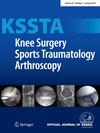Anterior cruciate ligament reconstruction rehabilitation: Decades of change
Abstract
Current anterior cruciate ligament reconstruction (ACLR) rehabilitation practice guidelines lack updates in key areas: open kinetic chain (OKC) quadriceps strengthening, neurocognitive training and psychological interventions. Recent research shows that OKC exercises, when combined with closed kinetic chain exercises, improve strength without compromising graft integrity, though careful monitoring for knee pain and effusion is essential. Neurocognitive training, targeting reaction times, visual attention and dual-tasking, is promising for reducing reinjury risk but remains underutilized. Similarly, psychological responses, often assessed via patient-reported outcomes, are a critical part of the recovery process after ACLR, but how to address these responses for the individual patient remains unclear, emphasizing the need for individualized support. The European Society for Sports Traumatology, Knee Surgery, and Arthroscopy (ESSKA) is developing an ACL rehabilitation consensus to integrate these insights into actionable, evidence-based guidelines, ensuring tailored, patient-centered care that optimizes recovery and reduces reinjury risks.

 求助内容:
求助内容: 应助结果提醒方式:
应助结果提醒方式:


